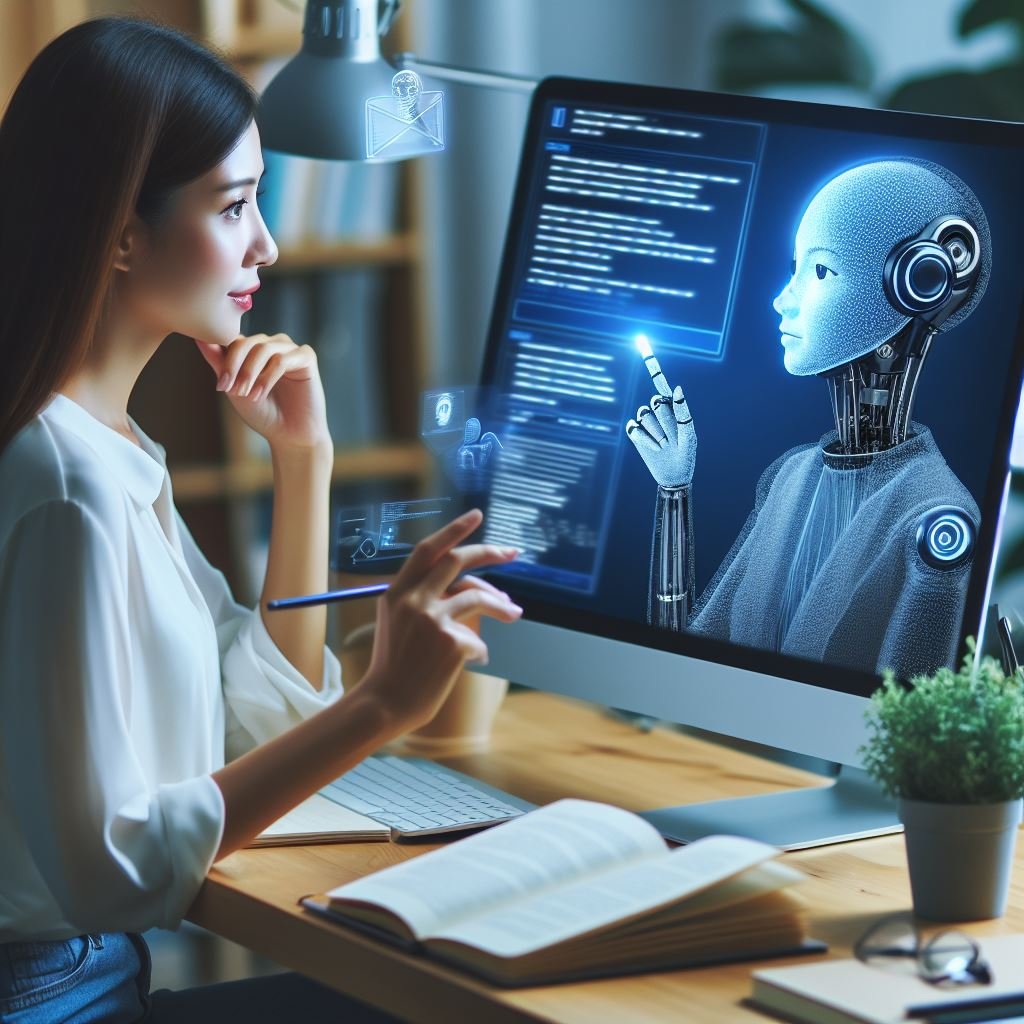Table of Contents
Introduction
Imagine a world where writers are no longer chained to their desks, battling writer’s block and struggling to meet deadlines. A world where artificial intelligence takes the reins, effortlessly churning out flawless pieces of prose with a level of creativity that rivals that of human writers.
This is the reality that we find ourselves in today, as AI writers are steadily becoming more prevalent in the writing industry. With their ability to generate content at lightning speed and adapt to various writing styles, AI writers are revolutionizing the way we approach writing, opening up a world of possibilities for businesses, marketers, and even aspiring authors.
The History of AI in Writing
Artificial Intelligence (AI) has come a long way in revolutionizing various industries, and writing is no exception. The use of AI in writing has evolved, with early developments paving the way for advancements in Natural Language Processing (NLP). Today, AI writing tools have emerged, reshaping the landscape of content generation, editing, and translation.
Early Developments
The roots of AI in writing can be traced back to the 1950s when researchers began exploring the possibilities of automated language processing. Early efforts focused on developing computer programs capable of translating text from one language to another. While these early developments were rudimentary compared to modern AI, they laid the foundation for future progress in the field.
Advancements in Natural Language Processing
Natural Language Processing (NLP) is a branch of AI that focuses on enabling computers to understand and process human language. Over the years, significant advancements have been made in NLP, allowing AI to analyze and generate human-like text with increasing accuracy. Breakthroughs such as deep learning algorithms and neural networks have contributed to the development of sophisticated AI writing models.
The Emergence of AI Writing Tools
With the advancements in NLP, AI writing tools have become more prevalent in today’s digital landscape. These tools utilize AI algorithms to assist writers in various aspects of the writing process, from generating content to proofreading and editing. The rise of AI writing tools has opened up new possibilities and opportunities for writers, making their work more efficient, accurate, and affordable.
Types of AI Writing
AI writing encompasses a range of applications, each with its unique benefits and functions. Let’s explore some of the key types of AI writing that have gained traction in recent years.
Automated Content Generation
Automated content generation is perhaps the most well-known application of AI in writing. With AI algorithms, it is now possible to generate vast amounts of content quickly and efficiently. AI can analyze data, understand context, and produce coherent and engaging articles, blog posts, and even product descriptions. This type of AI-generated content has found applications in e-commerce, digital marketing, and various other industries.
Content Editing and Proofreading
AI tools can also assist in the editing and proofreading process, helping writers improve the quality and accuracy of their work. With advanced grammar and spelling checkers, AI algorithms can identify errors, suggest corrections, and even offer style suggestions. This capability not only saves time for writers but also ensures that the final piece of content is polished and error-free.
Copy Writing and Marketing
AI has also made significant strides in the field of copy writing and marketing. AI algorithms can analyze marketing trends, consumer behavior, and target audience preferences to generate persuasive and personalized marketing copy. From crafting catchy headlines to creating compelling ad campaigns, AI writing tools can assist marketers in driving engagement and conversion rates.
Translation Services
Translation is another area where AI has made a significant impact. AI-powered translation tools can accurately and quickly translate text from one language to another, breaking down language barriers and facilitating communication on a global scale. These tools not only save time and effort but also ensure that translations are accurate and contextually appropriate.

Benefits of AI Writers
The rise of AI writers brings several benefits to both writers and businesses alike. Let’s delve into some of the key advantages that AI writing tools offer.
Increased Efficiency and Productivity
One of the primary benefits of using AI writing tools is the increased efficiency and productivity they bring to the writing process. AI algorithms can generate content at a much faster rate than humans, allowing writers to focus on higher-level tasks such as research and analysis. This enhanced efficiency allows writers to produce more content in less time, ultimately boosting their productivity and output.
Improved Accuracy and Quality
AI writing tools excel in accuracy and quality, thanks to their ability to analyze vast amounts of data and learn from it. These tools can detect and correct grammar and spelling errors, suggest improvements in writing style and provide valuable insights into content optimization. By leveraging AI, writers can produce high-quality, error-free content that resonates with their target audience.
Cost-effectiveness and Affordability
AI writing tools can significantly reduce costs associated with content generation and translation. By automating these processes, businesses can save resources that would otherwise be spent on hiring freelance writers or professional translators. Moreover, AI tools are often more affordable than hiring human writers, making them accessible to individuals and businesses with varying budgets.
Challenges and Concerns
While AI writers bring numerous benefits, there are also challenges and concerns to address.
Potential Job Displacement
The rise of AI writers has raised concerns about potential job displacement in the writing industry. As AI algorithms become more advanced, there is a possibility that certain writing tasks could be fully automated, leading to a decreased demand for human writers. However, it is important to note that AI writing tools should be viewed as complementary rather than as a complete replacement for human creativity and expertise.
Ethical Considerations
The ethical implications of AI in writing also deserve careful consideration. AI algorithms are trained on large datasets, which can inadvertently perpetuate biases present in the data. This raises concerns about the fairness and accuracy of AI-generated content. Striking the right balance between AI automation and human oversight is crucial to ensure ethical and unbiased content creation.
Maintaining Authenticity and Creativity
While AI writing tools excel in generating content based on established patterns and trends, they may struggle with originality and creativity. Authenticity and creative flair are often valued in writing, particularly in literary and artistic contexts. The challenge lies in maintaining a balance between leveraging AI’s capabilities and preserving the unique human touch that makes writing truly captivating.

AI Writer Tools and Platforms
Several AI writing tools and platforms have gained popularity due to their effectiveness and user-friendly interfaces. Let’s explore a few notable examples.
GPT-3 (Generative Pre-trained Transformer 3)
GPT-3 is a powerful AI language model developed by OpenAI. It is capable of generating human-like text in a wide range of writing styles and genres. GPT-3 has been lauded for its ability to generate creative content, making it a valuable tool for writers seeking inspiration or assistance in various writing projects.
Grammarly
Grammarly is a widely used AI-powered writing assistant that helps writers improve their grammar, spelling, and style. It provides real-time suggestions and corrections, helping writers enhance the clarity and readability of their content. Grammarly’s user-friendly interface and wide range of features have made it a favored tool among many writers.
QuillBot
QuillBot is an AI paraphrasing tool designed to assist writers in achieving the perfect balance between creativity and clarity. It can rephrase sentences, generate synonyms, and improve the overall flow of the text. QuillBot’s advanced AI algorithms make it a valuable tool for writers looking to enhance their writing style and make their content more engaging.
Articoolo
Articoolo is an AI content generator that uses advanced algorithms to create unique articles based on given keywords or topics. It analyzes numerous sources to gather relevant information and generates coherent and readable articles. Articoolo’s ability to generate content quickly makes it a useful tool for businesses and individuals looking to produce quality content within tight deadlines.
AI in Journalism and News Writing
The field of journalism has seen a significant transformation with the introduction of AI in various aspects of news writing.
Automated News Generation
AI algorithms can now generate news articles based on raw data and information. Natural Language Generation (NLG) algorithms analyze data from multiple sources and transform it into coherent news stories. This ability to automate news generation can be incredibly valuable in delivering timely and relevant information to readers.
Fact-checking and Information Verification
In an era of misinformation and fake news, AI plays a crucial role in debunking false information. AI-powered fact-checkers can quickly analyze large volumes of data, cross-reference sources, and provide accurate information in real time. This helps journalists and news organizations to verify information and combat the spread of misinformation.
Personalized News Delivery
AI algorithms can deliver personalized news content based on the preferences and interests of individual readers. By analyzing user behavior and data, AI-powered news platforms can curate and recommend news articles tailored to the reader’s specific interests. This personalized approach enhances the news reading experience and ensures that readers receive relevant and engaging content.

AI in Creative Writing
AI is also making its mark in the realm of creative writing, offering new possibilities and collaborations for writers.
AI-generated Fiction and Poetry
AI algorithms have already demonstrated their ability to generate fiction and poetry that is indistinguishable from human-authored works. AI-generated stories and poems have proven to be thought-provoking and captivating, pushing the boundaries of creativity and challenging traditional notions of authorship.
Assistance in Idea Generation and Plot Development
AI tools can assist writers in generating ideas and developing plots. By analyzing patterns and trends in existing literature, AI algorithms can suggest storylines, character development, and plot twists. This collaborative approach allows writers to leverage the AI’s insights and create more engaging and imaginative stories.
Collaborative Writing with AI
AI can act as a collaborative writing partner, offering suggestions and feedback to writers throughout the writing process. AI algorithms can identify areas for improvement, offer alternative word choices, and even help with sentence structure. This collaboration between human creativity and AI insights can lead to the creation of more refined and polished works.
AI and Language Learning
The integration of AI into language learning has transformed the way we acquire and master new languages.
AI-powered Language Learning Apps and Platforms
AI-powered language learning apps and platforms provide personalized learning experiences tailored to individual learners’ needs. These apps utilize AI algorithms to adapt to the learner’s proficiency level, pace, and learning style, offering targeted exercises and feedback. This personalized approach makes language learning more efficient and engaging.
Translation and Language Adaptation
AI translation tools have made language learning more accessible by enabling learners to translate texts from one language to another. Additionally, AI algorithms can adapt language instruction to learners’ native language, making it easier to understand and comprehend new languages. This linguistic adaptability enhances the overall language-learning process.
Enhanced Language Teaching Methods
AI has revolutionized language teaching methods, with interactive chatbots and virtual language tutors offering real-time feedback and practice opportunities. These AI-powered language instructors can engage learners in conversation, assess pronunciation, and provide immediate corrections. As a result, language learners can enhance their speaking and listening skills in a dynamic and supportive environment.

Future Implications and Possibilities
As AI continues to advance, we can expect even more exciting developments in the field of AI writers. Let’s explore some future implications and possibilities.
AI Writers as Writing Coaches/Tutors
In the future, AI writers could become invaluable writing coaches and tutors. These AI-powered writing assistants could provide real-time feedback and grammar suggestions, and guide writers towards improvement. AI coaches/tutors could help writers refine their craft, enhance their writing skills, and offer personalized support throughout the writing process.
Enhancement of Human Creativity with AI
AI has the potential to enhance human creativity by offering novel insights, expanding the realm of possibilities, and pushing creative boundaries. By collaborating with AI tools, writers can explore new writing styles, experiment with different perspectives, and step out of their comfort zones. The integration of AI can spark inspiration and open doors to innovative storytelling techniques.
Integration of AI with Virtual Reality Writing Environments

The integration of AI with virtual reality (VR) can create immersive writing environments, enabling writers to immerse themselves in virtual worlds and gain unique perspectives. Imagine being able to transport yourself to a historical setting, a futuristic dystopia, or another planet to gather inspiration for your writing. AI-powered VR environments hold immense potential for unlocking new levels of creativity and imagination.
Conclusion
AI writers have transformed the writing industry, bringing unprecedented efficiency, accuracy, and affordability. From automated content generation to personalized news delivery and creative collaborations, AI is reshaping the way we write and consume written content. While there are challenges and concerns to address, the benefits and possibilities of AI in writing are undeniable. As technology continues to advance, the future of AI writers holds exciting prospects for writers, learners, and the entire writing community.
Frequently Asked Questions
How has AI impacted the writing industry?
AI has significantly transformed the writing industry by introducing tools that streamline content creation, optimize material, and enhance productivity. From news articles to marketing copy and even novels, AI writing tools are revolutionizing how we produce written content.
What is the role of artificial intelligence in writing?
Artificial intelligence plays a multifaceted role in writing:
– Content Creation: AI assists in generating personalized and unique content, democratizing the writing process.
– Content Optimization: It analyzes material for SEO, engagement, and readability improvements.
– Audience Analysis: AI tools understand user data, helping authors tailor content to resonate with specific audiences.
– Grammar Check: AI detects and corrects grammatical and spelling errors in real-time.
– Multilingual Writing: AI enables content creation in various languages.
How does AI affect writing and writing instruction?
AI tools enhance efficiency and quality, but concerns exist about potential job displacement and the risk of formulaic content. Balancing AI assistance with human creativity remains crucial.
How has AI impacted the industry?
AI has influenced various sectors, including:
– Publishing: AI-powered writing tools benefit content creation.
– E-commerce: Improved product descriptions lead to higher engagement and sales.
– Customer Service, Education, and Healthcare also benefit from AI.
Which industry does AI impact the most?
While AI impacts multiple industries, its influence is particularly pronounced in technology, healthcare, finance, and marketing.
What is the biggest impact of AI?
The democratization of content creation and the ability to produce high-quality material regardless of writing expertise.
What are the positive and negative effects of AI?
– Positive: Enhanced productivity, efficiency, and content quality.
– Negative: Job displacement, generic content, and ethical concerns
What are the 3 negative impacts of AI on society?
– Job Displacement: AI may replace certain roles.
– Bias and Fairness Issues: AI algorithms can perpetuate biases.
– Privacy Concerns: AI collects and analyzes personal data.
How has AI positively impacted a specific industry or sector?
In healthcare, AI aids in diagnostics, drug discovery, and personalized treatment.
What are the commonest ways AI is used today?
AI powers chatbots, recommendation systems, fraud detection, autonomous vehicles, virtual assistants, and more
Why is AI important in the industry today?
AI enhances efficiency, accuracy, and innovation, driving progress across sectors.
How can AI improve industry?
By automating tasks, optimizing processes, and providing data-driven insights.
What can AI do that humans cannot?
AI excels at processing vast data sets, pattern recognition, and repetitive tasks.
Is AI good or bad?
AI is a tool; its impact depends on how we wield it. Responsible use is essential.
Why is AI important to the future?
AI will continue to shape industries, solve complex problems, and drive technological advancements.






